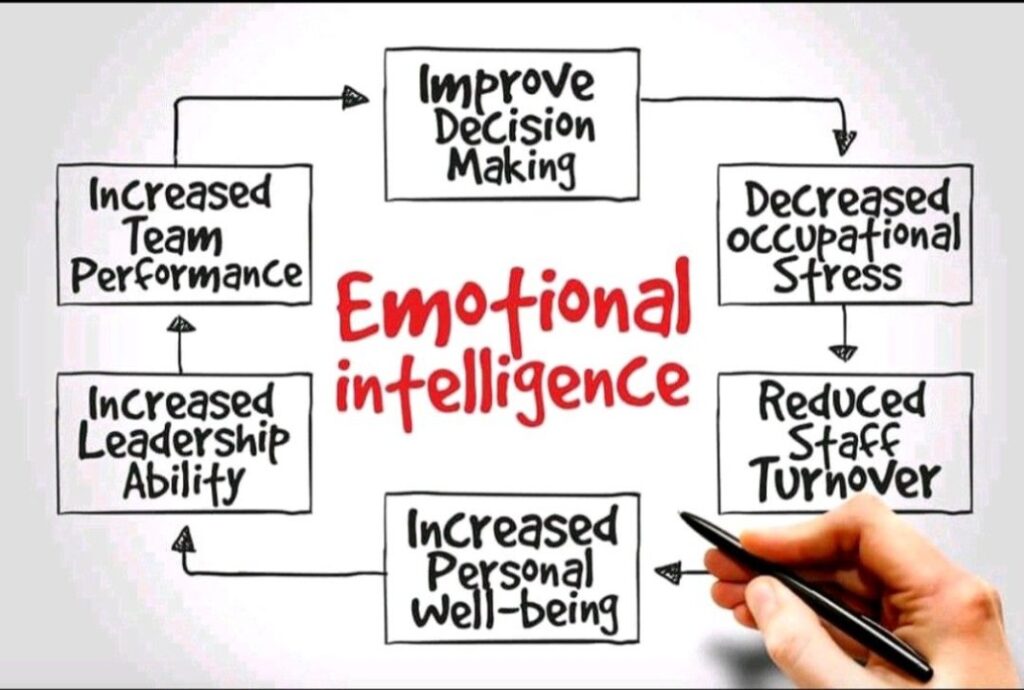Why is emotional intelligence in teams important?

Why is emotional intelligence in teams important? ChatGPT Emotional intelligence (EI) in teams is crucial for building a cohesive and productive work environment. It refers to the ability of team members to understand and manage their own emotions as well as recognize and influence the emotions of others. High emotional intelligence within a team can lead to improved communication, collaboration, and overall team performance. Here’s a detailed look at why emotional intelligence in teams is so important:
Emotional intelligence (EI) in teams is crucial for building a cohesive and productive work environment. It refers to the ability of team members to understand and manage their own emotions as well as recognize and influence the emotions of others. High emotional intelligence within a team can lead to improved communication, collaboration, and overall team performance. Here’s a detailed look at why emotional intelligence in teams is so important:
1. Enhances Communication
- Clearer Interactions: Emotional intelligence helps team members communicate more clearly and effectively. Members who are attuned to their own emotions can articulate their thoughts and feelings more precisely, reducing misunderstandings and misinterpretations.
- Active Listening: Team members with high EI listen actively to others, paying attention to verbal and non-verbal cues. This fosters a culture of respect and ensures that everyone feels heard and understood.
- Constructive Feedback: EI enables team members to provide constructive feedback, focusing on the task rather than personal criticism. This encourages openness and a willingness to accept feedback, essential for personal and team growth.
2. Builds Trust and Empathy
- Trust Among Members: Teams with high emotional intelligence cultivate an atmosphere of trust. Members are more likely to be open and honest with each other, knowing that their emotions and opinions are respected and valued.
- Empathy and Understanding: Emotional intelligence fosters empathy, allowing team members to understand and appreciate different perspectives. This empathetic approach helps in resolving conflicts amicably and strengthens the bond among team members.
- Supportive Environment: EI creates a supportive environment where team members feel safe to express themselves. When individuals feel supported, they are more likely to collaborate effectively and contribute their best work.
3. Facilitates Conflict Resolution
- Identifying Conflicts Early: Team members with high EI can recognize the early signs of conflict and address them proactively. By understanding the emotions behind disagreements, they can resolve issues before they escalate.
- Emotion Management: Emotional intelligence equips team members with the skills to manage their emotions during conflicts, ensuring that discussions remain productive and focused on finding solutions rather than getting derailed by emotional outbursts.
- Collaborative Problem Solving: EI promotes a collaborative approach to problem-solving, where team members work together to find mutually beneficial solutions. This leads to more effective conflict resolution and a harmonious work environment.
4. Increases Team Cohesion
- Shared Goals and Vision: Emotional intelligence helps teams align their individual goals with the team’s objectives, creating a shared vision. This alignment fosters unity and a sense of purpose, motivating team members to work towards common goals.
- Stronger Relationships: Teams with high EI build stronger interpersonal relationships, leading to increased cooperation and collaboration. These strong bonds contribute to a sense of belonging and commitment to the team’s success.
- Inclusive Culture: EI promotes an inclusive culture where diversity is embraced and different perspectives are valued. This diversity of thought enhances creativity and innovation within the team.
5. Boosts Team Performance and Productivity
- Motivation and Engagement: Teams with high emotional intelligence are more motivated and engaged. Members feel connected to their work and their colleagues, leading to increased productivity and job satisfaction.
- Adaptability: Emotionally intelligent teams are better equipped to adapt to changes and challenges. They can manage stress effectively and maintain a positive attitude, even in difficult situations, ensuring continued performance.
- Innovation and Creativity: EI encourages an open-minded approach to problem-solving, fostering an environment where creativity and innovation thrive. Team members feel free to explore new ideas without fear of judgment.
6. Enhances Leadership Effectiveness
- Inspirational Leadership: Leaders with high emotional intelligence inspire and motivate their teams. They understand the emotional dynamics of the team and can lead with empathy and compassion, earning the respect and trust of their team members.
- Decision-Making: Emotionally intelligent leaders make informed decisions by considering the emotional impact on the team. This leads to more ethical and thoughtful decision-making that benefits the entire team.
- Developing Talent: Leaders with EI focus on the growth and development of their team members. They provide mentorship and coaching, helping individuals reach their full potential and contributing to the overall success of the team.
7. Fosters a Positive Work Environment
- Positive Team Culture: Emotional intelligence contributes to a positive team culture where members feel valued and appreciated. This positive atmosphere boosts morale and creates a supportive environment for everyone.
- Work-Life Balance: Teams with high EI recognize the importance of work-life balance and support each other in maintaining it. This balance leads to increased job satisfaction and reduces burnout, contributing to a healthier and more productive workforce.
- Emotional Well-Being: EI enhances the emotional well-being of team members, reducing stress and anxiety. A focus on emotional health leads to happier, healthier, and more engaged team members.
Conclusion
Emotional intelligence is a vital component of successful team dynamics. It enhances communication, builds trust, and fosters collaboration, leading to improved team performance and productivity. By prioritizing emotional intelligence, teams can create a positive and inclusive work environment where individuals feel valued and motivated to contribute their best work. Whether in the workplace or any group setting, the importance of emotional intelligence cannot be overstated, as it is a key factor in building cohesive and effective teams.